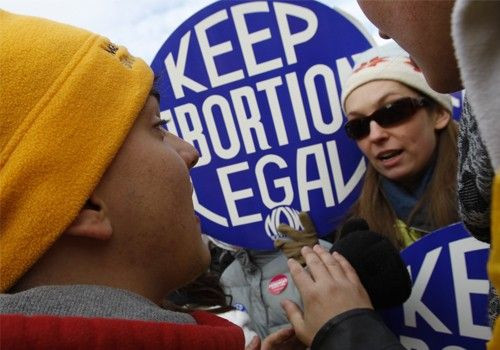Mississippi Personhood Amendment: As Election Day Nears, Voters Are Narrowly Divided

While Mississippians will be voting for their new governor on Tuesday, Nov. 8., a constitutional amendment that would give a fertilized human egg the same rights and protections as a living adult has received more attention than the candidates vying to be the state's next leader.
The Personhood Amendment, officially known as Initiative 26, would define a person as every human being from the moment of fertilization, cloning or the functional equivalent thereof. The amendment would virtually outlaw abortion -- even in cases of rape or incest -- while critics, such as the Mississippi State Medical Association, argue it could criminalize physicians who perform medically-necessary terminations on women experiencing life-threatening pregnancies.
Amendment Would Also Outlaw In-Vitro Fertilization
The amendment would also outlaw in-vitro fertilization, stem cell research and birth-control methods that stop fertilized eggs from embedding to the uterine wall, such as IUDs and the morning after pill. Some Personhood opponents claim the initiative could go as far as banning hormonal birth control pills.
Whether or not a majority of Mississippi residents are in favor of the initiative is difficult to say. Although Gov. Haley Barbour discussed his concerns about the Personhood Amendment on multiple occasions last week, on Friday the Republican governor-- who has emphasized that he believes life begins at conception -- announced he voted for the amendment early via an absentee ballot.
I voted for it. I struggled with it, Barbour told The Associated Press.
Still, the governor has not offered his full support to the initiative. During an appearance on NBC's Meet the Press on Sunday, Barbour said he was still concerned about how the amendment would apply to ectopic pregnancies, a life-threatening condition in which a fertilized egg implants somewhere other than the uterus.
Both of the candidates vying to replaces Barbour -- Phil Bryant, a Republican and Johnny DuPree, a Democrat -- have said they will vote for the Personhood Amendment.
A new poll from the Public Policy Polling survey indicates that Mississippians are split on the Personhood issue. Forty-five percent of respondents said they supported the amendment, compared to 44 percent of those who oppose it. Eleven percent of voters are undecided on the issue.
Interestingly, the poll found that men are more likely to support Initiative 26 then women. Moreover, white voters were twice as likely to voice their support of the amendment (54 percent) than black voters (26 percent).
Some Pro-Life Groups Balk
The threat to women's reproductive health and safety posed by Initiative 26 has led to a backlash from even traditionally pro-life parties. A Catholic Bishop in Mississippi reportedly sent letters to all the clergy in the Diocese of Jackson, urging them not to endorse the Personhood amendment because it could threaten their efforts to overturn Roe v. Wade.
According to a statement from Bishop Joseph Latino, while the Roman Catholic Church is unequivocally pro-life, it does not always publicly support every initiative that comes before us in the name of pro-life, the Mississippi Catholic reports.
The National Right to Life organization has also refused to endorse Personhood efforts, citing similar concerns about its potential to damage efforts aiming overturn Roe vs. Wade, the federal law legalizing a woman's right to receive an abortion up until viability.
Personhood USA, the Colorado-based non-profit Christian ministry that has been driving Personhood legislation, has been advocating similar legislative efforts in several states. Supporters hope the passage of Initiative 26 in Mississippi will energize related Personhood efforts in states such as Florida, Montana, Oregon, Ohio, Nevada and California.
Initiative 26 is not the only constitutional amendment proposed on Tuesday's ballot. Mississippi residents will also vote on Initiative 27, which if passed would require every state resident to obtain government-issued photo identification in order to vote.
Initiative 31 would prohibit government from taking private property by eminent domain and then transferring it to other individuals.
© Copyright IBTimes 2024. All rights reserved.





















